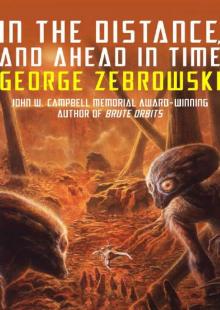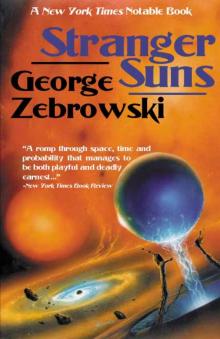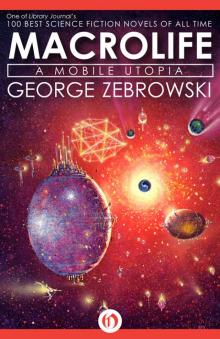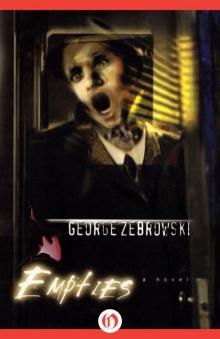- Home
- George Zebrowski
Black Pockets Page 4
Black Pockets Read online
Page 4
She smiled at him when she opened the door. She was dressed in white shorts, a blouse, and leather sandals. “Come in,” she said, stepping back. She might have been Vera, years later, except that Vera had been pretty.
He came in and she motioned him to the sofa. He sat down. She took the chair that faced him.
Leaning forward with a drawn expression on her face, she asked, “What is it, Frank?”
He smiled. “You do know I like you, don’t you?”
She seemed startled and sat back. “Do I?”
“I’ve been watching you. By the way, where’s your boyfriend?”
“I’m not seeing him now....”
“Good.”
“Good? Why?”
“You didn’t really like him.”
She looked into his eyes, flooding him with her vulnerability and hurt.
“You’re really interested in me?” she asked mockingly.
“Yes,” he said, glancing at her thighs and feeling certain that he would enjoy her.
“Do you have eyes? I’m a well-groomed dog. Why should someone as good-looking as you want me except to play with? Is it a bet of some kind? Or are you a freak?” He could see that it was humiliating her to say the words, but she was determined to protect herself by exposing him before he could trap her. “Maybe you just don’t have any taste,” she said regretfully.
“No, no,” he answered, appalled at how little she thought of herself. He could see her self-loathing turning outward toward him. And yet a part of her had to be hoping that it was true, that he liked her, that at last something good might happen to her, something happy and warm and forgiving.
He watched it all flash through her eyes like a vision of salvation; and then she rejected it, retreating behind her armor.
She stood up, and he felt her strength as she glared at him. “You’re not going to use me. Go away. Get out of here.”
“But why—” he started to say.
“Let me spell it out. You’re too good-looking to want me, so I’m some sort of convenience—right? What are you curious about? You think I’ll be so grateful, I’ll do anything. Is that it?”
“No—” he started to say as he stood up.
“Get out of here!” she shrieked. “You filthy son of a bitch! You think that lying about calling me from the Bahamas would do the trick? What was that all about?”
She was herding him toward the door, her cheeks flushed with rage. He wanted to embrace her, quiet her, but she looked as if she would tear at his face.
He backed away, opened the door and slipped out. She shoved it shut after him, and he heard locks closing.
“You’re wrong, Alice,” he said loudly, hoping to calm himself.
The door opened a crack and she put her head out. “What are you going to do?” she said jeeringly. “Put a ring on my finger? Or just move in for a few weeks?”
“Couldn’t we just get to know each other?” he asked meekly. The blood was pounding in his ears.
“No sex?”
“Sex would be nice,” he said, not wishing to insult her, “but we could skip it.”
“We? Who’s this we? You’re flapping out there, Frank.”
“Why do you think I’m so terrible? I’ve never done anything to you!”
A fearful look came into her face, and he couldn’t tell whether it was fear of him or panic. She was speechless, as if trying to reverse herself, to start over with him, because she knew that she could not afford to pass up the smallest chance. She had to be ready when fortune smiled; but it was too late.
He stood there and smiled at her, trying to look harmless.
“Is this the wise look you save for crazy females?” she said, then moved back and slammed the door. He heard her crying.
Putting his head to the door, he said, “I’m sorry, Alice. Couldn’t we be friends?”
“I don’t want your pity. Go away and find yourself some bimbo. It’s what you really want.”
“Alice—”
“I’ll call the police!”
“I’m sorry I bothered you.”
He felt her hunger reaching out to him, and trembled inside.
“I’m good enough to fuck, but not enough to love,” she said suddenly.
“What? How can you say that about yourself?” he asked, impressed by the conviction in his voice, and felt a growing self-control.
“It’s true. I’ve had it proven to me often.”
“Alice, open the door,” he said sternly.
“So you can be nice to me? What can you do?”
She was right. What could he do? Say that he loved her? That he would treasure her for always? That he would devote himself to making her happy? That’s what she needed, but was he ready to do that? He didn’t know. She was inside him with her pain, twisting. He was infected with her fear, standing on a cliff and unable to back away from the edge. In a moment he would be a bloody mess on the rocks below.
Back away, he told himself. Don’t say another word. Just go away and forget it. He felt calmer.
“Are you there, Alice?”
Mercifully, she did not answer, and he breathed a sigh of relief as he retreated from her door.
In his apartment, he stood in the kitchen and considered going away again. Maybe to Hawaii. He could take another week off if he wanted to. Unable to decide, he stripped down to his shorts and went to exercise on his Soloflex, turning on a bit of Vivaldi on the way to drown out his thoughts.
After he had worked up a sweat, he stopped and lay there, cooling down as the Vivaldi went into a slow movement, and realized that the door to his life had had to stay closed. He lived outside himself, afloat in other lives because he had no life of his own. Nothing he had ever feared had ever happened to him—not disease, financial troubles, or lasting disappointments in love, because he had never loved anyone.
He got up from the machine, went out into the living room and looked out the window at the old, wooden house across the street. It was a three-story, gabled structure that would soon be torn down because the landlord was unable to rent it. Suddenly he imagined that he had moved into the second floor with only a bed and a table, because he had lost his job and his possessions. All he had was a bit of money, the bed, and the table.
He imagined sitting at the table, looking out through the curtainless window, looking back at himself across the street, wondering which of them was real, feeling his awareness switch back and forth like a swinging pendulum....
I was something else once, he told himself, suddenly afraid of the wishes lurking in his fears. What did he want to happen? What had he ever wanted to happen to him?
He clenched his teeth, suddenly dismayed by what he had become, and the cap on his left front tooth slipped off into his mouth.
He held the cap in his mouth, rolling it around on his tongue, afraid to spit it out. The ground-down, naked tooth would look like the bottom of an ice cream cone and be discolored from years of being scaled away, someone had once told him. As he touched it with his tongue, he felt the sensitive tooth hanging there like a salty stalactite.
He looked at the building across the street again, and his phone chirped.
“Hi, this is Frank,” his message announced. “You know what to do.”
“Frank?” Alice said softly, and he felt her trembling self-hatred. “You can come over, if you still want to. Now would be okay.”
The vision in his right eye went black; then in his left.
Both eyes cleared, and he longed to escape into the bare room in the old house across the street.
“Frank?” Alice asked with a painful ache in her voice. “Please pick up.”
The beeps cut her off, and he felt his stomach seize up into a solid mass of stone. His breath came with difficulty.
At any moment, if he didn’t prevent it, the black, unforgiving nothing would invade his eyes again. He had to write her a convincing, heartfelt note at once, then go see her as soon as possible.
Desperately, he t
urned away from the window, went to his small, cherry desk, sat down, pulled open the drawer violently, and began to fumble around in it for a sharp pencil.
Hell Just Over the Hill
RICK GOT ON THE BUS AS IF ENTERING A CONFESSIONAL, overnight round trip to anywhere, found an empty double toward the middle, and began to drift into self-examination as the half-filled bus left the station. Unlike most who mull while traveling, he usually arrived at his destination and at some definite conclusions at the same time. He had sometimes felt a bit guilty about this, wondering if he was avoiding some terrible truths, and was only too willing to accept simple-minded lies about himself. But today it was different. After a few idle thoughts about leaving Rita and all his possessions behind, his mind cleared suddenly, as if he had walled himself off from the worrisome regions of his mind and was free at last to look outward beyond himself. He just needed to get away for a day. No destination, no luggage. Tomorrow he would come home to the woman he loved and try again. As the bus fled north through the spring afternoon, the sun broke through in the west every few minutes, and it seemed to him that the coach was trying, and failing, to turn east to escape the sun. Ahead, the spring green hills were like broccoli under a nuclear cumulus cloud, marking hell just over the hill, where he imagined infernos of red coals smoldering in deep valleys under a bruised and bloodied sky. At his left and right the hills reminded him of the bellies and pubic mounds of reclining women, and Rita’s dark eyes stared into him with resentment as he raised his hand to strike her across the face. And he had done so—because she thought he wouldn’t, softening the blow as much as he could; but she hadn’t noticed that as she fell back onto the bed and wept into the pillow. There was just no way to convince her that he had been faithful to her. But it wasn’t any of that. It was the lack of money, the bad job he had, their inability to plan for anything more than a month ahead. It was the disappointment and pity they saw daily in each other’s eyes.
The driver coughed into the microphone and said, “Sir, please keep your boy seated. Standing is not permitted while the bus is in motion.” The man, a Hasidic Jew wearing a hat, long bushy beard, and forelocks, motioned for his son to sit down, then glanced with embarrassment at his fellow passengers. In a few moments the boy was up again, and the driver repeated his request, sounding even more irritated, and the father looked even more uncomfortable as he pulled his son back down into the seat. Rick noticed that the driver had resumed his animated conversation with the middle-aged woman in blue jeans sitting just behind him, ignoring the sign above the windshield that prohibited passengers from talking to him while the bus was in motion.
As evening came, the bus seemed to gain speed, as if entering a vast cave, with engines roaring to keep up its courage. It rushed by a small lake, whose waters shook in the twilight like the gelatinous skin of a beast. Near a small town, the bus crept by a well-known mental hospital, where the troubled had responded to the world by withdrawing into madness, while their keepers had adapted by becoming unfeeling and objective, wearing the paper blinders of theory. It seemed saner to him to lose one’s mind in the world’s circus of unreason than to congeal into a fortress of practicality and convenience. The genuinely insane were often sane among themselves, while displaying all the diagnostic labels to doctors and staff. As refugees from life, they knew amongst themselves who was truly ill—the real monstrosities prowling outside.
At one small town that was scarcely more than a row of old, wooden houses separated by a short strip of asphalt roadway, a tired-looking teenage girl, chubby but still vaguely nubile, got on with a sloppily clothed baby and took the empty seats in front of him, putting the child in the one free seat across the aisle. The well-dressed older woman in the window seat looked at the child with disdain through designer glasses, and got up, saying, “I’ll go sit up front, and she can have both seats. She seems very tired.” The girl did not thank her. After a few moments she crossed the aisle and began changing the little girl’s diapers. As the smell escaped, people in the nearby seats began to hold their noses. Finally, the procedure was over, and the girl went back to her seat, avoiding everyone’s eyes as she sat down, took out a package of cheese twists from her bag, and began to devour them noisily.
“Mommy,” the baby called out, then began to cry. She told it to shut up, and sat back to finish her snack.
When night came, the window at his right became a black mirror, in which his black shape also rode a bus. He leaned back and closed his eyes, dreaming of long-limbed women who smiled at him, and realized that he hadn’t thought of Tess in months. “I’ll tell my father and he’ll make you marry me,” she had said happily, slipping on her pink slacks over her long legs. “A dairy farm is not such a bad life.” He had been too eager to believe that she was not underage. Maybe next year he wouldn’t think of her at all. But as he listened to the teenaged mother crunching her cheese twists in the seat in front of him, he wondered whether Tess had gotten an abortion after he left, or was now a weary, hopeless teen mother like this one. He was lucky that Rita had never found out about Tess. The important fact was that Tess meant nothing to him, and could never have meant anything to him.
He opened his eyes and saw that another bus seemed to be trying to race his own. He peered out through the window, thinking that the drivers must be buddies on the same route. The glass seemed unusually cold against his nose and forehead.
He put up his hands to shut out the light, and across the short distance of no more than five feet he saw a long face with wide-set eyes and dark hair peering back at him. He pulled back, startled by the resemblance to himself. The other figure also pulled back in surprise. Rick sat back, afraid that he was losing his mind, then looked again and saw the other figure doing the same.
Several passengers in both buses were now peering out, and he heard people cry out on his side of the aisle. A few figures in the other bus were waving. Both drivers beeped their horns.
“What’s going on?” a woman shouted up front. “Someone need help?”
“Stop the bus!” an old man cried in panic.
Both buses began to slow down. Rick saw a rest area coming up—a large, asphalt-covered half circle tucked into a wooded area, with a dozen picnic tables on the grass before the trees. There was a break in the trees, but it was too dark now to appreciate the view. A wind waved the branches as if a storm was coming.
The other bus pulled in first. His bus crept in across the gravel and stopped alongside. Rick squinted through the window and saw the other driver come out. His driver also emerged. The two doubles stood gaping at each other, then both men staggered over to a picnic table and sat down, trying to absorb the shock.
As they watched this meeting of the drivers, a cry went up from the people in the seats ahead of him. A few people were getting up and leaving the bus.
“What is this?” a man demanded from his left.
“Can’t you see?” the older woman shouted at him, and the man crossed the aisle to look out.
Rick got up from his seat and went past the young mother and her child. Both were sound asleep, oblivious to their surroundings, even though he bumped her with his thigh as he hurried forward.
He came out into the windy, spring night and joined the uneasy group that was curious enough to confront the people from the other bus. There was enough light spilling out between the coaches for him to get a good look at his double, who was standing just three feet away, in the same wrinkled tweed jacket and faded blue jeans, with a beaten expression on his face, accepting this strange doubling as if it were a judgment. At his left stood the woman in blue jeans, the Hasidic man, and the well-dressed older woman with designer glasses. Next to her stood two men who looked like plumbers. Rick glanced to his right and saw the same row of people repeated, then noticed that everyone from the other bus except his double was dressed too warmly for spring.
Silently, as their eyes adjusted to the light from the coaches, the two rows of doubles began to eye each other with curi
osity. His own took a step toward him and asked, “Did you do it, too?”
“What?” Rick asked in a whisper.
“You know.”
“What?” Rick repeated uneasily, feeling a rush of guilt, as if he were sharing the other’s thoughts and feelings. The four plumbers were looking each other up and down. The two old women were staring at each other intently and adjusting their glasses. The Hasidic men seemed to bow to each other, then one spoke in a foreign language. Then they grabbed their hats to keep the wind from taking them.
“Well?” Rick’s double asked.
He took a deep, desperate breath suddenly, shook his head in denial, and backed away in fear. The others, on both sides, were also turning away and drifting back toward their buses, dazed, not wanting to know more, he realized, because there was nothing to be gained from talking to their doubles. They were all afraid, knowing that somehow a wall had crumbled, a necessary wall that must never be breached. Rick glanced toward the picnic table where he expected to see the two drivers, but they were both gone. The wind picked up in the trees, and a gust hit him in the face. He turned away.
“Wait,” his double said, stepping toward him. “I’m Rick Barrow.” The words came out in a strange, distorted roll over the rush of the wind, and Rick was suddenly afraid that it might be dangerous for doubles to touch or even speak to each other. He retreated, mentally struggling to slip behind the wall that should not have come down.
Then, on each side, the passengers turned and got back on the bus. He gave his double a wave; the other did the same, as if in a mirror, and turned away. He looked up and saw the young mother at the window, mouth open as she stared across at her double.
Rick came back to his seat, then decided to move back by two from the mother and her child. He slipped into the window seat and gazed out at the other bus, noticing that even the coach number was the same.
“Where’s our driver?” a man shouted up front. “Let’s get going!”

 In the Distance, and Ahead in Time
In the Distance, and Ahead in Time Stranger Suns
Stranger Suns Black Pockets
Black Pockets Brute Orbits
Brute Orbits Cave of Stars (Macrolife Book 2)
Cave of Stars (Macrolife Book 2) Macrolife
Macrolife Empties
Empties Heart Of The Sun Star Trek 83
Heart Of The Sun Star Trek 83 The Sunspacers Trilogy
The Sunspacers Trilogy